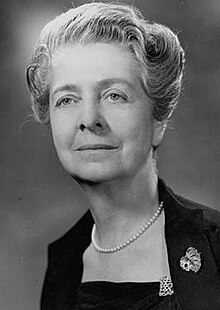Rita Levi Montalcini
| Senator for life Rita Levi-Montalcini OMRI OMCA |
|
|---|---|

Rita Levi-Montalcini, circa 1975. Image courtesy of the Bernard Becker Medical Library, Washington University School of Medicine
|
|
| Born |
22 April 1909 Turin, Italy |
| Died | 30 December 2012 (aged 103) Rome, Italy |
| Citizenship | Italy |
| Nationality | Italian |
| Fields | Neurology |
| Institutions | Washington University in St. Louis |
| Alma mater | University of Turin |
| Known for | Nerve growth factor |
| Notable awards |
|
Rita Levi-Montalcini, OMRI, OMCA (Italian pronunciation: [ˈriːta ˈlɛːvi montalˈtʃiːni]; 22 April 1909 – 30 December 2012) was an Italian Nobel laureate, honored for her work in neurobiology. She was awarded the 1986 Nobel Prize in Physiology or Medicine jointly with colleague Stanley Cohen for the discovery of nerve growth factor (NGF). From 2001 until her death, she also served in the Italian Senate as a Senator for Life.
On 22 April 2009, she became the first Nobel laureate ever to reach the age of 100, and the event was feted with a party at Rome's City Hall. At the time of her death, she was the oldest living Nobel laureate.
Levi-Montalcini was born on 22 April 1909 in Turin, to a Sephardi Jewish family. She and her twin sister Paola were the youngest of four children. Her parents were Adele Montalcini, a painter, and Adamo Levi, an electrical engineer and mathematician.
In her teenage years, she considered becoming a writer and admired Swedish writer Selma Lagerlöf, but after seeing a close family friend die of stomach cancer she decided to attend the University of Turin Medical School. Her father discouraged his daughters from attending college, as he feared it would disrupt their potential lives as wives and mothers, but eventually he supported Levi-Montalcini's aspirations to become a doctor. While at the University of Turin, the neurohistologist Giuseppe Levi sparked her interest in the developing nervous system. After graduating with a summa cum laude M.D. in 1936 she remained at the university as Levi's assistant, but her academic career was cut short by Benito Mussolini's 1938 Manifesto of Race and the subsequent introduction of laws barring Jews from academic and professional careers.
...
Wikipedia
